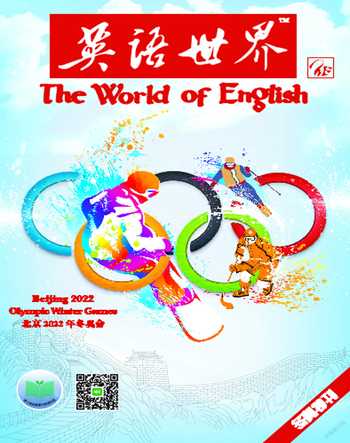The Beginning and Development of the Winter Olympics 冬奧會的起源和發展
房彥昊
The Olympic Winter Games (official name) is a major international sporting event that occurs once every four years. Unlike the Summer Olympics, the Winter Olympics feature sports practised on snow and ice. It includes the biathlon (skiing and shooting), bobsled, ice hockey, luge (tobogganing), ski jumping, and ice skating and skiing events. Demonstration sports may also be included.
[2] The IOC Congress decided that the host nation of the 1924 Summer Olympics, France, would host a separate “International Winter Sports Week” under the patronage of the IOC. Chamonix was chosen to host this “week” of events. The Games proved to be a success when more than 250 athletes from 16 nations competed in 16 events. In 1925 the IOC decided to create a separate Olympic Winter Games and the 1924 Games in Chamonix was retroactively designated as the first Winter Olympics.
[3] Until 1992, the Winter and Summer Olympic Games were held in the same years, but in accordance with a 1986 decision by the International Olympic Committee (IOC) to place the Summer and Winter Games on separate four-year cycles in alternating even-numbered years, the next Winter Olympics after 1992 was in 1994.
[4] The Winter Games have evolved since its inception. Sports and disciplines have been added and some of them, such as Alpine skiing, luge, short track speed skating, freestyle skiing, skeleton, and snowboarding, have earned a permanent spot on the Olympic programme. Others (such as curling and bobsleigh) have been discontinued and later reintroduced, or have been permanently discontinued (such as military patrol, though the modern Winter Olympic sport of biathlon is descended from it). Still others, such as speed skiing and skijoring, were demonstration sports but never incorporated as Olympic sports.
[5] The rise of television as a global medium for communication enhanced the profile of the Games. It created an income stream, via the sale of broadcast rights and advertising, which has become lucrative for the IOC. This allowed outside interests, such as television companies and corporate sponsors, to exert influence.
[6] The Winter Olympics has been hosted on three continents by eleven different countries. The Games have been held in the United States four times (1932, 1960, 1980, 2002); in France three times (1924, 1968, 1992); and in Austria (1964, 1976), Canada (1988, 2010), Japan (1972, 1998), Italy (1956, 2006), Norway (1952, 1994), and Switzerland (1928, 1948) twice. Also, the Games have been held in Germany (1936), Yugoslavia (1984), and Russia (2014) once.
[7] No city in the southern hemisphere has hosted or even been an applicant to host the Winter Olympics; the major challenge preventing one hosting the games is the dependence on winter weather, and the traditional February timing of the games falls in the middle of the southern hemisphere summer.
[8] Twelve countries—Austria, Canada, Finland, France, Great Britain, Hungary, Italy, Norway, Poland, Sweden, Switzerland and the United States—have sent athletes to every Winter Olympic Games. Six of those—Austria, Canada, Finland, Norway, Sweden and the United States—have earned medals at every Winter Olympic Games, and only one—the United States—has earned gold at each Games. Norway leads in terms of number of gold medals and overall number of medals.
冬季奧林匹克運動會(正式名稱)是一項每四年舉辦一次的重要國際體育賽事。與夏季奧運會不同的是,冬奧會項目都在冰雪上進行。項目有冬季兩項(滑雪與射擊)、雪車、冰球、雪橇(平底雪車)、跳臺滑雪、滑冰和滑雪等,也包含純觀賞類項目。
[2]國際奧委會全會決定贊助1924年夏季奧運會主辦國法國獨立舉辦“國際冬季運動周”。運動周選址于沙莫尼。來自16個國家的250名運動員角逐16個項目,結果大獲成功。1925年,國際奧委會決定創立一個單獨的冬季奧運會,同時將1924年在沙莫尼舉辦的賽事追認為第一屆冬奧會。
[3] 1992年之前,冬奧會與夏奧會都在同一年舉辦。1986年,國際奧委會決定,每四年一次的冬季和夏季奧運會于間隔的偶數年交叉進行,所以1992年之后的下一屆冬奧會在1994年舉辦。
[4]創辦之后的冬奧會一直在改變,增加了大項和小項,其中高山滑雪、雪橇、短道速滑、自由式滑雪、鋼架雪車和單板滑雪成為了永久性的奧林匹克項目。其他一些項目(冰壺、雪車)被取消過之后又重新恢復,或被永久性的移除(例如軍事巡邏,但之后成為現代冬奧會中的冬季兩項的前身)。仍有一些,比如速度滑雪和狗拉雪橇從未正式設項,但仍然屬于觀賞類項目。
[5]作為一種全球交流媒介,電視的普及大大增加了奧運會的曝光率。轉播權的銷售以及廣告也為國際奧委會帶來了穩定的豐厚收入。這給像電視臺和公司贊助商等外部利益方提供了提升影響力的機會。
[6]三個大陸11個國家曾經主辦過冬奧會。舉辦的國家和年份有:美國4次(1932,1960,1980,2002),法國3次(1924,1968,1992),奧地利(1964,1976)、加拿大(1988,2010)、日本(1972,1998)、意大利(1956,2006)、挪威(1952,1994)和瑞士(1928,1948)各2次,德國(1936)、南斯拉夫(1984)和俄羅斯(2014)各1次。
[7]南半球國家從未主辦過冬奧會或提出主辦申請,不能主辦的主要挑戰是冬奧會依賴于冬季氣候,而且冬奧會通常的舉辦時間在二月份,恰巧是南半球的盛夏。
[8]每屆冬奧會都派出運動員參加的國家有12個:奧地利、加拿大、芬蘭、法國、英國、匈牙利、意大利、挪威、波蘭、瑞典、瑞士和美國。其中6個在每屆冬奧會都獲得過金牌:奧地利、加拿大、芬蘭、挪威、瑞典和美國。而美國是唯一在每屆奧運會上都獲得過金牌的國家。挪威排在歷史金牌總數和獎牌總數的第一位。

